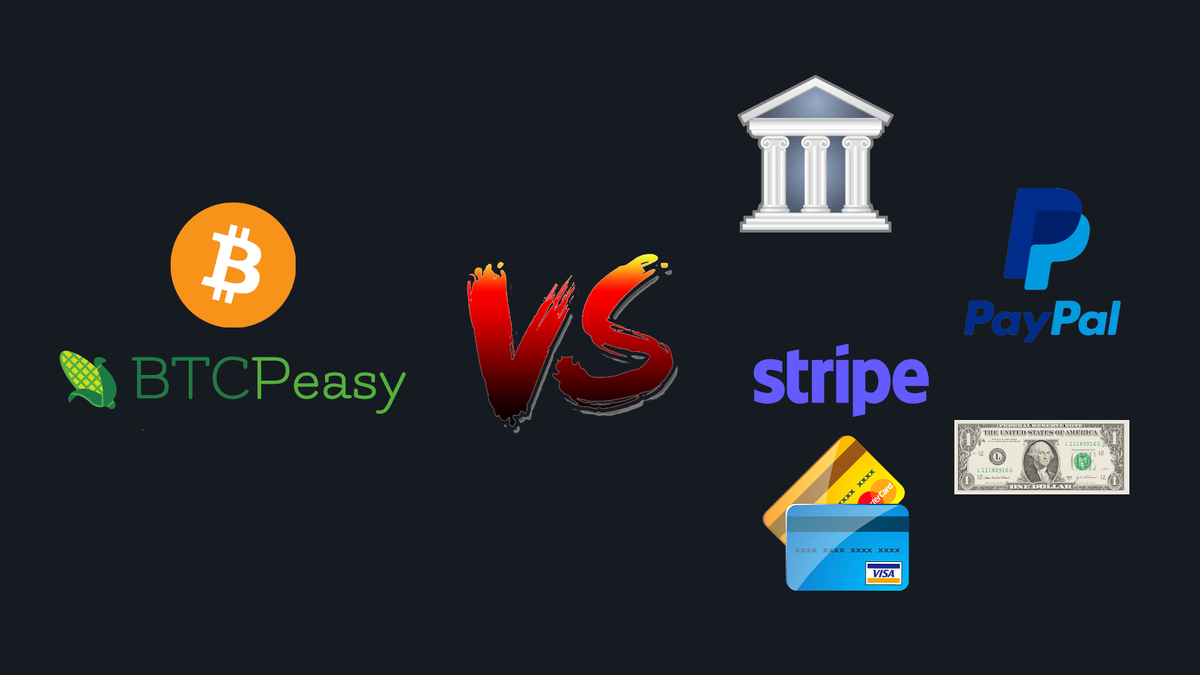How does BTCPeasy compare against other payment methods?

In this article, we'll explore how Bitcoin stacks up against other payment methods. Before diving into comparisons, let's consider what makes a payment method effective: quick settlement, user-friendliness, and minimal or no fees. We'll compare Bitcoin with:
- Cash
- Checks and money orders
- Debit and credit cards
- Online payment processors
- Bank transfers and wires
Cash
Cash remains a popular payment method, favored by businesses due to its lower transaction costs compared to card payments—averaging around 30 cents per transaction. This low cost results from time and labor spent on handling cash rather than fees. Accepting cash is straightforward, requiring no merchant accounts or point-of-sale terminals. It's ideal for small purchases and doesn't carry chargeback risks like credit cards.
However, cash is not the most secure option, as it can be easily lost, stolen, or destroyed, with added risks of counterfeiting and contamination concerns heightened by the Covid-19 pandemic. Cash also necessitates physical presence, making online and international transactions impossible.
In contrast, Bitcoin, though it incurs a small fee and may not settle instantly, cannot be destroyed or counterfeited and is usable worldwide. Storing large amounts of cash can be problematic for businesses, unlike Bitcoin. Bitcoin transactions are irreversible, preventing chargebacks, and with the Lightning Network, settlements can be immediate. While "cash is king" is a common saying, in terms of monetary policy, Bitcoin offers a more stable system with a fixed supply and defined inflation schedule, unlike fiat currencies subject to devaluation by central banks.
Checks and Money Orders
Checks and money orders share cash's limitations, compounded by longer settlement times due to intermediaries. Initially used for larger purchases, checks involve paper forms linked to bank accounts. The buyer fills out the check, the seller submits it to their bank, and the funds are deducted after processing. The trend toward faster payments has decreased check usage over time.
Bitcoin transactions are much quicker than checks. Checks are not free, as checkbooks must be purchased, and there's the risk of bounced checks when funds are insufficient. Bitcoin avoids this issue through a check/verify system, requiring users to have sufficient funds in their wallets, easily verified via nodes or block explorers.
Debit and Credit Cards
To accept card payments, you'll need the right technology, such as payment processing services from a financial institution or provider. This may involve investing in point-of-sale terminals and covering costs for upgrades, maintenance, and repairs. Additionally, there's a monthly fee for maintaining a merchant account, which also incurs variable costs like a set fee for debit transactions and percentage fees for credit cards. Some providers impose a minimum monthly charge, meaning you pay a set amount regardless of transaction volume. As card usage increases, so do your costs. Credit cards also pose risks like true fraud and chargeback fraud. Unlike card transactions, Bitcoin is a "push" transaction, making chargeback fraud impossible, as transactions are final and irreversible. There are no monthly charges or minimum balance requirements with Bitcoin wallets, and software wallets can accept payments through simple QR codes without the need for point-of-sale terminals.
Online Payment Processors
Though online payment processors have simplified business transactions, they often involve setup fees, plus flat and percentage-based transaction fees. For instance, PayPal charges over 4%. Accepting Bitcoin through platforms like BTCPeasy incurs almost no fees. Traditional processors are costly and slow for international transfers and aren't accepted universally. Bitcoin, on the other hand, is globally available, making it ideal for cross-border transactions.
Bank Transfers and Wires
Bank wires, ranging from $15 to $50 per transfer, are pricier than some electronic payments. Fees vary based on factors like the bank, type of transfer, and amount. Domestic incoming wires are on the cheaper side, while international outgoing wires cost more. Although funds transfer quickly, the recipient might wait several hours for funds to appear due to internal bank processing. In contrast, Bitcoin transactions can be completed within an hour on-chain or instantly with the Lightning Network. Wire transfers often have poor exchange rates, leading to potential losses, and their anonymity makes them susceptible to scams.
Given these factors, Bitcoin stands out for its advantages in settlement time, fees, and security. BTCPeasy also leverage the Lightning Network for instant and low-cost transactions. Bitcoin's accessibility via smartphones or computers makes it available to those without traditional banking options.
We believe businesses can benefit from Bitcoin payments alongside existing methods. As Bitcoin adoption grows, we're committed to providing a straightforward solution for acceptance. Start with BTCPeasy for free and begin accepting Bitcoin payments in minutes. Learn more about our platform today.
